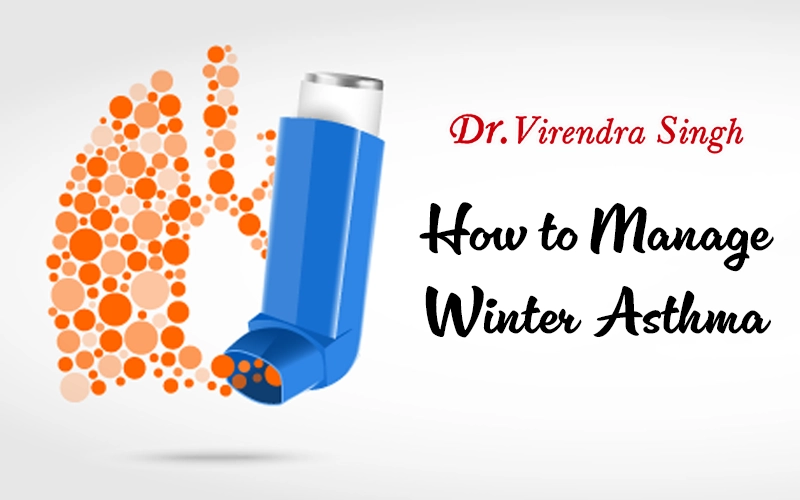
How to Manage Winter Asthma: One typical asthma cause is the weather. For many people who have asthma, the winter months can be particularly harmful. Imagine your bronchial tubes—the airways that supply air to your lungs—as tree branches to better comprehend your triggers. When someone has asthma, their airways are constantly somewhat inflamed. They narrow as a result of inflammation, which makes it more difficult for air to enter the lungs. That’s why breathing becomes more difficult for those who have asthma, even when they’re not experiencing a flare-up.
Variations in temperature and weather patterns are known to irritate respiratory tracts and cause asthma attacks. Cold weather can make breathing more difficult for those whose bronchial tubes are already irritated.
Weather Induced Asthma – Know Its Link with Winter
The airways enlarge and narrow when someone has asthma. People who have asthma may cough, wheeze, or experience breathing difficulties when they are exposed to triggers, which exacerbate asthma symptoms. Cold air is a common asthma trigger for a lot of people.
According to Dr. Virendra Singh, asthmatics may have difficulties throughout the winter because of:
- Chilly temperatures: Dr. Virendra Singh says, “Cold air irritates the airways.” The airways may enlarge from the chilly winter air, narrowing them. Additionally, the muscles around the airway may contract in cold weather, making it even more difficult for air to get through.
- Dry air: The air is typically rather dry in the winter. That also holds true indoors, where a running furnace warms the air. Extremely dry air has the same irritating properties as cold air.
- Season of the flu: According to Dr. Virendra Singh, “winter also brings more exposure to cold and flu viruses.” “Many children suffer from viral-induced asthma, meaning a respiratory infection can trigger an asthma attack.”
- Indoor allergens: People prefer to spend more time indoors during colder weather. For certain individuals, this implies increased exposure to indoor asthma triggers such as dust mites, pet dander, and tobacco smoke.
Ways to Deal with Cold-Weather Asthma
Having asthma does not have to imply a miserable winter. There are things you may do to lessen asthma episodes in the winter.
- 1. Reduce your exposure
Try to limit your child’s time outside if they cough whenever they come into contact with chilly air. Dr Virendra Singh”limiting time outside as best you can.”
- 2. Take your medication.
It’s crucial to constantly take asthma prescriptions as directed. However, that’s particularly true in the winter. According to Dr. Virendra Singh, “Inhaled steroids are medications that should be taken on a daily basis to reduce inflammation, even when you or your child feel well.” “If you’re sensitive to the cold, it’s especially important to use them regularly in the winter.”
- 3. Put together a bundle
Your youngster’s breathing will become slightly less dry and frigid if you wrap a warm scarf over their mouth and nose.
- 4. Simply include water.
Reintroducing some moisture to the winter air can be accomplished by using a humidifier before bed. (Just remember to clean humidifiers often to prevent mold growth, which can aggravate asthma.) According to Virendra Singh, saline nasal sprays can also aid in rewetting parched nasal passages.
- 5. Remain healthy
Avoid persons who are sick with the flu or colds to prevent contracting viruses. Make frequent hand washing a habit to prevent the spread of germs.
- 6. Modify your actions
Individuals who have asthma caused by exercise, in which intense physical activity narrows the airways, also frequently have cold sensitivity. Try to avoid doing too much outside in the cold weather.
- 7. Seek assistance
Dr. Virendra Singh advises getting in touch with your physician or your child’s pediatrician for assistance if you’re worried about asthma as the winter winds blow in. “Never hesitate to contact us with any inquiries,” she advises. “In order for you to enjoy the season, we can help you manage your symptoms.”
What Else Should I Know About Cold Air and Asthma?
Asthma affects people differently. You should treat an asthma flare-up that is brought on by cold weather in the same way you would any other.
On the absolute freezing days, try to stay inside and keep an eye on the weather. If you must go outside, cover up with a scarf or face mask. Protect your health to prevent an asthma attack brought on by a virus. Adjust the interior air humidity to a level that is most pleasant for you to breathe.
When taking medication, adhere to your doctor’s instructions. Do not stop taking your prescription medication, even if you are feeling well, if it is an inhaler or another asthma management tool. Always adhere to your established plan to prevent needless flare-ups.
Conclusion
In order to effectively manage your asthma during the colder months, preparation is essential. Together with your provider, develop a winter asthma plan.
It’s wise to arrange routine checks in addition to adhering to your winter asthma plan. This allows your doctor the chance to keep an eye on you, make sure your medication is effective, and make sure your asthma is under control for the winter.
Call us to make an appointment with Dr. Virendra Singh or make an online reservation right now to find out more about the best ways to manage asthma in the winter.
